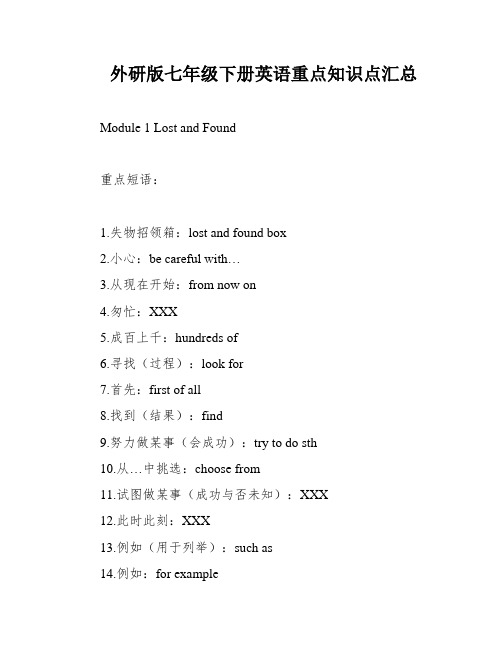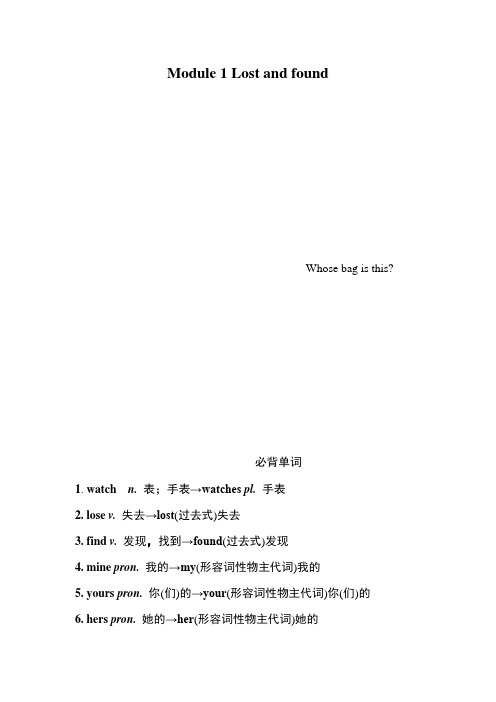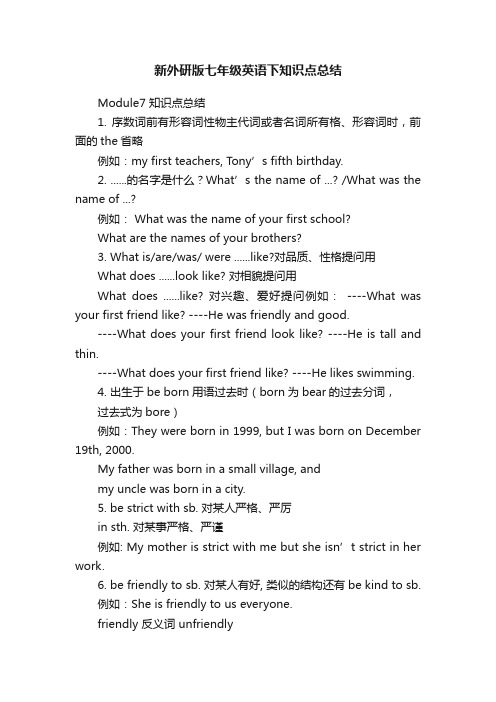新外研版七年级下册知识点整理1
外研版七年级下册英语重点知识点汇总

外研版七年级下册英语重点知识点汇总Module 1 Lost and FoundIn this module。
we learn some XXX related to lost and found items。
Firstly。
we have the "lost and found box," which is aplace where lost items are kept until they are claimed。
We also learn to be careful with our belongings and to look for lost items。
From now on。
we should try to be more XXX.If we do lose something。
we can try to find it by looking around and asking others for help。
It's XXX hundreds of items are lost every day。
so we should be XXX in our search。
First of all。
we should check the lost and found box to see if our item has been turned in。
If we don't find it there。
we can try to ask around and see if anyone has seen it.When looking for lost items。
we can choose from different methods。
We can try to find it ourselves。
or we can ask othersfor help。
外研版七年级下册英语重点知识点汇总

外研版七年级下册英语重点知识点汇总Module 1 Lost and Found重点短语:1.失物招领箱:lost and found box2.小心:be careful with…3.从现在开始:from now on4.匆忙:XXX5.成百上千:hundreds of6.寻找(过程):look for7.首先:first of all8.找到(结果):find9.努力做某事(会成功):try to do sth10.从…中挑选:choose from11.试图做某事(成功与否未知):XXX12.此时此刻:XXX13.例如(用于列举):such as14.例如:for example重点句型:1.这是谁的 (XXX)2.帮助某人做某事:help sb do XXX.3.请小心保管…:XXX…4.欢迎来到…:e to +地点5.给某人打call sb at +电话号码语法总结:物主代词:表示所属关系的代词(…属于谁的)单数:人称形容词性物主代词名词性物主代词第一人称 my XXX第二人称 your yours第三人称 his hers its复数形容词性物主代名词性物主代第一人称 our ours第二人称 your yours第三人称 their theirs形容词性物主代词:必须和名词在一起,例如XXX,your XXX…名词性物主代词:相当于与之相对应的形容词性物主代词+名词,例如XXX.Module 2 What Can You Do?重点短语:1.与某人相处融洽:get on well with sb.2.弹钢琴:play the piano3.打乒乓球:play table XXX4.…怎么样?=how about…。
what about…5.担心…:XXX…6.擅长做某事:be good at doing sth.7.放风筝:fly a kite重点句型:无语法总结:无2.high-tech高科技的3.XXX虚拟现实4.XXX机器人仆人5.XXX太空旅行6.XXX可再生能源7.self-driving cars自动驾驶汽车8.ic engineering基因工程9.XXX寿命10.artificial intelligence人工智能重点句型】1.In the future。
外研版英语七年级下册知识点(通用8篇)

外研版英语七年级下册知识点(通用8篇)外研版英语七年级下册知识点(1)一、单词辨析wear, in 与putwear 动词,穿着,戴着。
强调穿的状态。
in 介词,后接衣服或颜色的词。
着重衣服的款式或颜色。
put on 动词,穿上,戴上,强调穿的动作,后接衣服,鞋帽。
spend 花费,度过①+ spend +时间/金钱+ on 人在上花费时间/金钱eg:I spend much time on②+ spend +时间/金钱+ ( in) doing 花费时间金钱做某事eg: I spend much time watching③+spend +时间+ with + 和某人一起度过。
eg: I spend my weekend with my二、短语forward to + / 期待某事/期待做某事eg:We are looking forward to visiting Hong 我们都很期待去香港玩。
I am looking forward to your 我很期待你的到来。
go sightseeing = do some sightseeing观光游览类似结构:go shopping 购物 go cooking 做饭go washing 洗衣服 go cleaning 打扫卫生a picnic 去野餐英语中经常用have或take, make等动词+ 组成词组。
eg:have a good time 玩得高兴 have a rest 休息一会take a walk 散步 make a presentation 做一个介绍oneself 过的愉快相当于have a good time, 在口语中,用作祈使句。
eg:I’m going to enjoy myself during the May Day 我打算在五一假期好好玩一玩。
I hope you enjoy yourself this 我希望你今晚过的愉快。
外研版英语(新标准)七年级下册模块知识点归纳总结(全册)

Module 1 Lost and foundWhose bag is this?必背单词1. watch n.表;手表→watches pl.手表2. lose v.失去→lost(过去式)失去3. find v.发现,找到→found(过去式)发现4. mine pron.我的→my(形容词性物主代词)我的5. yours pron.你(们)的→your(形容词性物主代词)你(们)的6. hers pron.她的→her(形容词性物主代词)她的7. careful adj.仔细的;认真的;小心的→carefully adv.仔细地;认真地;小心地8. crayon n. 蜡笔9. eraser n. 橡皮擦10. glove n. 手套11. wallet n. 钱包12. whose pron. 谁的13. tape n. 录音带;录像带14. purple adj. 紫色的;紫红色的;n. 紫色;紫红色必背短语15. first of all 首先,第一16. look at 看17. be careful with 小心(对待)……18. from now on 从现在开始19. a lot of 许多,大量20. lost and found box 失物招领箱必背句子21. Welcome back to school, everyone!欢迎大家返校!22. Whose bag is this?这是谁的书包?23. Here's a purple wallet!这里有一个紫色的钱包!24. Let me see...让我看看……Are they yours?必背单词1. leave v.丢下;遗忘→left(过去式)丢下;遗忘2. strange adj.奇怪的→stranger n.陌生人3. camera n. 照相机4. phone n. 电话;电话机5. plane n. 飞机6. taxi n. 出租车7. why adv. 为什么8. airport n. 机场;航空港9. hundred num. 百10. thousand num. 千11. boat n. 船12. duck n. 鸭13. pig n. 猪14. sausage n. 香肠;腊肠必背短语15. mobile phone 移动电话;手机16. lost and found office 失物招领处17. in a hurry 匆匆忙忙18. hundreds of 几百;成百上千19. look for 寻找20. at the moment 目前;此时必背句子21. Welcome to the New York City Lost and found office.欢迎来到纽约市的失物招领处。
外研版七年级下册英语知识点

外研版七年级下册英语知识点一、动词的时态英语动词根据时间的不同,可以分为一般现在时、一般过去时和一般将来时。
1. 一般现在时:表示经常性的动作、习惯、真理、客观事实等。
例句:I often go to the park on weekends.She speaks English very well.2. 一般过去时:表示过去某个时间发生的动作或状态。
例句:He watched a movie last night.They lived in London two years ago.3. 一般将来时:表示将来要发生的动作或存在的状态。
例句:We will visit our grandparents next week.She is going to travel to France next month.二、名词的数英语中,名词的数有单数和复数两种形式。
1. 单数名词:表示一个人或事物。
例句:There is a cat in the garden.He is my friend.2. 复数名词:表示多个人或事物。
例句:There are many books on the shelf.They are my friends.三、形容词的比较级和最高级形容词的比较级和最高级可以用来比较两个或多个人或事物的程度。
1. 比较级:用于比较两个人或事物。
例句:She is taller than her sister.This book is more interesting than that one.2. 最高级:用于比较三个或三个以上的人或事物。
例句:He is the tallest boy in the class.This is the most expensive car in the showroom.四、情态动词情态动词可以用来表示说话人的态度、意愿、推测、可能性和应该性等。
1. can:表示能力和许可。
新外研版七年级英语下知识点总结

新外研版七年级英语下知识点总结Module7 知识点总结1. 序数词前有形容词性物主代词或者名词所有格、形容词时,前面的the省略例如:my first teachers, Tony’s fifth birthday.2. ......的名字是什么?What’s the name of ...? /What was the name of ...?例如: What was the name of your first school?What are the names of your brothers?3. What is/are/was/ were ......like?对品质、性格提问用What does ......look like? 对相貌提问用What does ......like? 对兴趣、爱好提问例如:----What was your first friend like? ----He was friendly and good.----What does your first friend look like? ----He is tall and thin.----What does your first friend like? ----He likes swimming.4. 出生于be born用语过去时(born为bear的过去分词,过去式为bore)例如:They were born in 1999, but I was born on December 19th, 2000.My father was born in a small village, andmy uncle was born in a city.5. be strict with sb. 对某人严格、严厉in sth. 对某事严格、严谨例如: My mother is strict with me but she isn’t strict in her work.6. be friendly to sb. 对某人有好, 类似的结构还有be kind to sb.例如:She is friendly to us everyone.friendly 反义词 unfriendly以ly结尾的形容词还有,lovely,lonely,ugly,silly,weekly,monthly,等等7. (a) very adj./adv.(原形) + n.太....,非常....,很..... quite( a/ an)+ adj./adv.(原形) + n.so+ adj./adv.(原形) +that +从句译为:如此…以至于too adj. to do sth. 译为:太……而不能例如: a very big watermelonquite a big watermelonThe watermelon is so big that I can’t eat it all.The watermelon is too big to be eaten.8. past 与pass的区别past 为介词,副词,形容词,如:(1). go past the hospital and turn left.(2). They are talking about past life. (3). It’s ten past four.而pass为动词,如: Please pass me the pen.The police car passed slowly.9. “在某地有……要做”用句型there is/are/was/were +sth.+to do…例如:There were a lot of things to do in Quincy.There are lots of interesting places to visit in Tianjin.表示“某人有某事要做”用have/has sth. to do例如: They had many things to do, and I have lots of books to read.10. one of + 名词复数表示“……中之一” One of my dear friends is a police.two of /some of/ many of/ most of……one of + the+最高级+名词复数例如:The Yangtze River is one of the longest rivers in China.Most of the people in this room are over forty.11. ……there was a big garden with lots of trees and therewas a small lake with many fish in it.with 的用法总结with用法归纳(1)“用……”表示使用工具,手段等。
最新外研版英语七年级下册知识点总结
最新外研版英语七年级下册知识点总结Module 1 Lost and found1、lost and found 失物招领the lost and found box 失物招领箱2、(1) welcome back to 欢迎回到某地... Welcome back to school.(2) welcome to +地点的名词欢迎来某地Welcome to China.(3) Welcome 跟地点副词时不带to welcome home 欢迎回家Welcome here .(4) You are welcome. 不用谢。
(5) give sb. a warm welcome 热烈欢迎某人They gave a warm welcome to us.3、first of all 首先= at first / firstly (常位于句首作状语,强调首要的事情或动作)First of all, you should finish your homework.4、there be 句型中谓语动词采用就近原则There is some food in the fridge.5、a lot of =lots of 许多既可以修饰可数名词复数,也可以修饰不可数名词。
There is a lot of water in the glass. I have lots of books in my room.6、(1) look at 看(强调“看”的动作)Come and look at my new coat.(2) look (不及物动词,单独使用,用以引起对方的注意) Look! That’s an English car.(3) see 看见(及物动词,强调“看”的结果) Can you see the bird in the tree?(4) watch 观看,仔细地看(比赛、电视、戏等)They are watching TV now.(5) read 看(书、报纸、杂志等) My mother is reading a book /a magazine /a newspaper.7、everyone/everybody 做主语,谓语动词用单数形式。
(完整版)外研版七年级英语下册知识点归纳及练习
MODULE1一、词汇。
1. listen 听(强调动作)hear 听见(强调结果)I listened carefully but I heard nothing. 我仔细听但什么也没听到2.on a (school) trip3. have a good time = enjoy oneself4. take pictures = take photos5. lie in the sun躺在阳光下lie on the beach 躺在沙滩上躺下【动】She is lying on her back. 她正仰卧着。
位于【动】London lies on the River Thames 伦敦位于泰晤士河畔说谎【动】You are lying to him! 你在对他说谎。
eg: Look! The boy ________on the bed and reading a book.A. is lyingB. lyingC. liesD. lie6. send sb. a postcard 寄给某人一张明信片send sth. to sb. = send sb. sth.7. anyway 无论如何(转移话题)8. buy some presents 买礼物buy sth. for sb. = buy sb. sth.9. enjoy sth. 喜欢某物enjoy oneself = have a good/ great time 玩的开心enjoy/ like doing sth. 喜欢做某事10. at this moment=now 此时此刻(现在进行时)11. leave work 下班be at work 上班He is at work. = He is working12. wait for buses 等公共汽车run for trains 赶乘火车(地铁)13. have afternoon tea 喝下午茶14. watch a ballet 看芭蕾see friends 看望朋友get dressed = dress oneself 穿衣;打扮eg: The boy can’t dress himself.15. call home 给家里打电话call sb. = give sb. a call= phone sb.二、语法。
外研社英语新版七年下册(M1__M2__M3全解)
We should take an active part in school activities.
12.mobile phone移动电话;mobile adj.可移动的The old lady sits on a mobile chair every morning.
13.talk, speak, tell, say区别
talk to强调谈话的对象是“单向的”。如:I am talking to Tom.(强调"I"单方面的对"Tom在谈话)
2.play the piano弹钢琴
3.speak Chinese说汉语
4.on the board在那块5.a. would like to do sth.想做某事。这是日常生活中用来向对方有礼貌地提出建议或要求的句型。其肯定回答:“Yes, I’d like/love to.”;否定回答:“Sorry./I’d like/love to, but I…”
5.there be句型的时态:
一般现在时There is/are
There is (some) milk in the fridge.
一般过去时There was/ were
There was nothing special about the meal
一般将来时There will be/ is going to be
every one即可指人,也可指物,可与介词of连用。Every one of us has a chance to speak at the meeting.
七年级下外研英语知识点
七年级下外研英语知识点在七年级下外研英语课程中,学生们将会学习一些基本的英语单词、语法规则、句子结构、听力和口语技巧等内容。
在这篇文章中,我们将会概括七年级下外研英语的知识点。
一、英语单词在七年级下外研英语课程中,学生们将会学习大量英语单词,包括颜色、数字、家庭成员、食物、服饰、动物、天气等常见单词,以及一些常用短语。
学生们应该掌握这些单词的读音和拼写,同时能够使用这些单词进行基本的对话。
二、英语语法和句型在七年级下外研英语课程中,学生们将会学习英语语法和句型。
学生们需要掌握一些基本的语法规则,如名词、动词和形容词的基本用法,以及一些简单的句式结构,如主语+谓语等句式。
此外,学生们还需要了解一些常见的英语句型,如感叹句、祈使句、疑问句和陈述句等。
三、英语听力和口语技巧在七年级下外研英语课程中,学生们将会学习如何进行英语听力和口语学习。
学生们需要了解一些基本的听力技巧,如注意力集中、边听边记录等。
此外,学生们还需要掌握一些英语口语技巧,如发音、语调、强调等,以提高口语表达能力。
四、常用短语和句型在七年级下外研英语课程中,学生们将会学习一些常用的英语短语和句型,如问候语、道歉语、感谢语、询问时间、询问方向等。
学生们应该掌握这些常用短语和句型的使用方法,以便在日常的英语学习和交流中更加自如地表达自己的想法和情感。
五、英语阅读和写作在七年级下外研英语课程中,学生们还将会学习一些基本的英语阅读和写作技巧。
学生们需要掌握阅读理解题的解题方法,包括阅读文章、分析问题和找寻答案。
此外,学生们还需要学习一些基本的英语写作技巧,如如何写好一篇简单的英语作文、如何使用正确的词汇和语法结构、如何进行正确的段落编排等。
总之,在七年级下外研英语课程中,学生们需要掌握大量的英语基础知识,包括英语单词、语法、听力、口语、阅读、写作等方面的内容。
通过不断的学习和练习,在英语学习过程中不断提高自己的英语能力,成为一名优秀的英语学习者。
- 1、下载文档前请自行甄别文档内容的完整性,平台不提供额外的编辑、内容补充、找答案等附加服务。
- 2、"仅部分预览"的文档,不可在线预览部分如存在完整性等问题,可反馈申请退款(可完整预览的文档不适用该条件!)。
- 3、如文档侵犯您的权益,请联系客服反馈,我们会尽快为您处理(人工客服工作时间:9:00-18:30)。
外研版七年级下册知识点整理Module 1 Lost and foundUnit 1 Whose bag is this?一、重点句子1.Welcome back to school.2. Please be careful with…from now on.3. Here is/are…4. There are a lot of things in it.二、重点短语和句型1. first of all2. Whose …is this?3. It’s mine.4. Is this…yours5. Are these…yours?6. lost and found box三、常见考点1. 掌握物主代词的用法2. look for, find 的用法3. lose, lost, find, found的用法Unit 2 Are they yours?一、重点句子1. They leave things on planes, on trains, on buses and in taxis.2. That’s why there are lost and found offices at airports and stations.3. Hundreds of people come here every day.4. At the moment, there are also some strange things at the New York City Lost and Found Office.二、重点短语和句型1. They are looking for…2. Whose are they?3. in a hurry4. fifteen kilos of sausages5. talk to sb6. get on the bus三、常见考点1. two hundred,hundreds of2. leave, forget四、本模块语法1. 名词性物主代词的用法2. 形容词性物主代词的用法3. 人称代词的用法Module 2 What can you do?Unit 1 I can play the piano.一、重点句子1. What about you?2. That’s all.3. Don’t worry about…4. Choose your favourite club.二、重点短语和句型1. Can you…?2. Yes, I can. / No, I can’t.3. Which club can…?4. I can’t…5. on the board6. ride a bike7. speak Chinese8. like cooking三、常见考点(不用解析)1. play table tennis和play the piano的用法2. teach sb sth宾格的用法3. can 的用法4. would like to doUnit 2 I can run really fast.一、重点句子1. I get on well with everyone, classmates and teachers.2. I’m always ready to help others.3. I do well at school.4. I’m sure everybody would like a clean classroom, just like home.二、重点短语和句型1. I’ like to be …2. I want to be…3. class/ PE/ cleaning monitor4. promise to do5. run fast6. be good at7. get the best score8. just like9. do cleaning三、常见考点1. be good at, do well in2. help sb do/to do/with sth3. get on well with4. make our classroom beautiful,make的用法四、本模块语法1. can 的用法Module 3 (有具体内容)Unit 1 (有具体内容)一、重点句子2. On Saturday morning, I’m going to check my email and do my homework.在周六上午,我打算查收一下我的电子邮件并做作业。
2. Who else is going to be there? 还有谁去?3. I’m going to stay at home alone. 我打算一个人在家呆着。
4. Don’t be silly! 别傻了!5. Would you like to join us? 你愿意加入我们吗?二、重点短语和句型1. go over lessons 复习功课2. help with the housework 帮忙做家务3. have a picnic 野餐4. at the weekend 在周末5. Would you like to do…? 你愿意做……吗?6. have a piano lesson 上钢琴课三、常见考点(不用解析)1. be going to do 的用法2. on Sunday morning/afternoon/eveningUnit 2 (有具体内容)一、重点句子1.I’m looking forward to the football match tomorrow.我期待着明天的足球比赛。
3. We are going to cheer the players. 我们打算为运动员们喝彩。
4.I’m going to enjoy myself during the May Day holiday. 我打算要在五一节期间玩得很愉快。
5. In the afternoon I’m going out with my family and friends. 在下午我和家人和朋友一起外出。
5. We are going sightseeing and going to have a picnic on the beach. 我们打算去观光游览并在沙滩上野餐。
二、重点短语和句型1. look forward to doing 盼望做某事2. cheer the players 为运动员喝彩3. spend time with family and friends 和家人和朋友一起度过时光4. go on a summer camp 参加夏令营5. sb+spend+时间/金钱+on sthsb+spend+时间/金钱+(in) doing sth三、常见考点1. spend的用法2.look forward to doing四、本模块语法一般将来时be going to doModule 4 (有具体内容)Unit 1 (有具体内容)一、重点句子1. Will schools be different in the future? 将来的学校会有所不同吗?2. In twenty years’ time, may be there won’t be any schools. 20年之后,或许就没有学校了。
3. Computers won’t be able to do that. 电脑却不能做那些。
4. Will students have a lot of homework to do? 学生将会有很多家庭作业要做吗?5. Will students need to go to school any more? 学生还将再需要去上学吗?二、重点短语和句型1. in the future 在将来2. be able to do 能够做…..3. not…..any more 不再4. a lot of free time 很多空闲时间5. get information on the Internet 在网上获得信息6. make friends 交朋友三、常见考点1. will+do2. be able to doUnit 2一、重点句子1. What will life be like in the future? 将来的生活会是什么样子的?2. In the future, a change of weather won’t mean a change of clothes. 在未来,天气的变化并不意味着衣服要更换。
3. We will wear a new kind of clothes. 我们将穿一种新型的衣服。
4. There will be no more light rain and cold wind in spring. 春天将不会再有细雨和寒风。
二、重点短语和句型1. come true 实现2. not only ….. but also 不但….而且…3. as well 也,还有三、常见考点1. not only ….. but also 不但….而且…四、本模块语法一般将来时willMODULE 7 My Past Life1. primary school 小学2. the name of ………的名字3. be born 出生于4. in England 在英格兰5. in Shanxi Province 在山西省6. quite difficult 非常难管7. on the east coast of America 在美国东海岸8. twelve years ago 12年前9. lots of things to do 许多事情要做10. last year 去年11. last weekend 上周末12. from…to…从…到…重点句子1. Where were you born? 你在哪里出生?2 I was born in…我出生在……3 What was the name of the village? 那个村庄叫什么?4 What was the name of your first school?你上的第一所学校叫什么名字?5 Who was your first teacher? 你的第一位老师是谁?6 She was very friendly. 她非常友好。
7 Who were your first friends? 你最早的朋友是谁呢?8 He was quite difficult. 他很难管。
